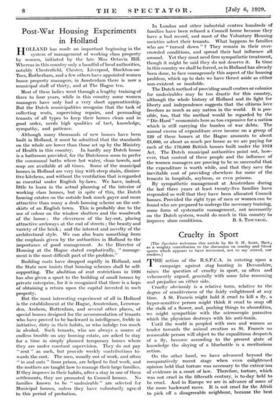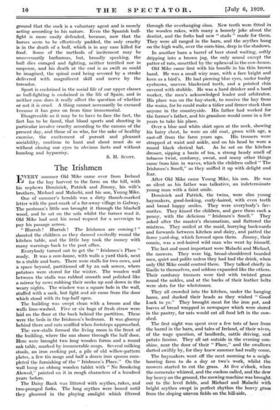Cruelty in Sport
[The Spectator welcomes this article by Sir S. H. Scott, Bart.. as a weighty contribution to the discussion on cruelty and blood sports which appears to have interested, not to say stirred, our readers.] THE action of the R.S.P.C.A. in entering upon a campaign against stag hunting in Devonshire, raises the question of cruelty in sport, so often and vehemently argued, generally with some false reasoning and prejudice on either side.
Cruelty obviously is a relative term, relative to the degree of sensitiveness of the fairly enlightened at any time. A St. Francis might hold it cruel to kill a fly, a hyper-sensitive person might think it cruel to snap off the stalk of a flower, and, pushing things to absurdities, we might sympathize with the microscopic parasites which the physician destroys with his anti-toxin.
Until the world is peopled with men and women as tender towards the animal creation as St. Francis no reasonable person will object to the expeditious despatch of a fly, because according to the present state of knowledge the slaying of a bluebottle is a meritorious action.
On the other hand, we have advanced beyond the comparatively recent stage when even enlightened -opinion held that torture was necessary to the extraction of evidence in a court of law. Therefore, torture, which was not cruel in the fifteenth century, is to-day held to be cruel. And in Europe we are in advance of some of the more backward races. It is not cruel for the Afridi .to pick off a disagreeable neighbour, because the best Afridi opinion countenances a form of sport which is highly exhilarating and gives a sporting chance to the quarry, who may very likely get in his shot first.
In judging any practice we have to consider, therefore, whether it is consonant with the general tenor of feeling at any given time. If it is not contrary to what is practical at a given stage of civilization, if it does not offend against the degree of sensitiveness attained by the better sort of people, it cannot be described as cruel ; it is cruel only in the eyes of the hyper-sensitive. If, on the other hand, the feelings and sensitiveness of the better sort Of people have advanced beyond the stage when other actions of a similar nature would be tolerated, then according to prevailing standards they are cruel.
For instance, in the opinion of the vast majority of people the killing of animals for food is held to be necessary, if regrettable. We have got so far that we demand that animals should be slaughtered with the least possible suffering, but we do not say, or at least the majority of people do not say, that it is cruel to slaughter animals.
There are those who think otherwise, and the day may come when the slaughtering of animals for food will be regarded as unnecessary and barbaric. If that day should come, and if a few should persist in requiring the slaughter of animals, then those people will rightly be regarded as cruel ; they will be behind the standards of their day.
This brings us to the point whether or not the sports called blood sports are in consonance with the accepted feelings of to-day. They are tolerated by the vast majority because the vast majority do not stop to think. Tradition is one of the most deeply rooted of human instincts and things are tacitly accepted because they have always been. Blood sports are accepted by the Uneducated and the thoughtless because they have always existed ; they are equally accepted by a large part of educated opinion because they enter largely into our social life and have never been seriously questioned. But it is doubtful whether they would stand the test of examination.
One test is to imagine an analogous degree of cruelty as an innovation, without the sanction of custom, and under that test it is difficult to see that blood sports would escape condemnation. It is difficult to imagine • the introduction of any new and untried form of amuse- ment involving the death of a bird or animal that would not cause repugnance, and the repugnance would be increased if the death were not always instantaneous, but sometimes a lingering one.
If we could imagine, for instance, a game requiring skill and quickness, such as a game of battledore with live birds as shuttlecocks, the amusement would be Unthinkable. Yet it would not, if the birds were killed by the blow, involve so much suffering as may be endured by a wounded bird which is not gathered after a shoot. The analogy is not quite exact, because such a game can be played well enough with an inanimate object. But We will suppose an added thrill and excitement in the flight of the live bird.
And there is another convincing test—the effect on an unaccustomed spectator ; there are few people of either sex, possessed of an average degree of sensibility, who are quite unmoved by the squeal of a wounded rabbit, or the -gaspings of a dying pheasant, or who can watch with complete equanimity the cutting of the throat of a deer, when it is experienced for the first time. It is a proof that such happenings are not in consonance with anything that would be usual, apart from sport.
It is true that the sensitiveness quickly disappears in • the eagerness of the sportsman. He becomes inured in a very short time, as the medical student becomes inured to necessary sights in the operating-theatre or the soldier to the inevitable horrors of the battle-field. But the first impression is the test, and the first impression of - the witness of a day with the guns or of the medical student or of the raw soldier is of something that is out of key with that to which he has been accustomed.
Judged by these tests, we are forced to the conclusion that blood sports are cruel in the sense that they arc inconsistent with the commonly . accepted standards of humanity at our present stage of civilization ;- and we come to this conclusion in spite of the exaggerations of those who would, endow a predatory animal like the fox with . the imaginative terrors of a stockbroker pursued _up Cheapside, ignoring the fact that an animal has often been known to feed quietly immediately after it has been in fear for its life.
There is some illogicality, too, in the concentrating of indignation on the chase of the stag, principally because its large size makes the circumstances of its death more conspicuous. Granting that the stag may have (although it is not certain) a higher mentality, and consequently more- acute feelings of- fear, than the hare, it is doubtful whether the sufferings . of an . exhausted stag are greater than those of a hare slowly worn down by the beagle, even allowing that death comes much more quickly to the hare when the end is reached.
- There is the same illogicality in the outcry against pigeon shooting at Monte Carlo. It is undoubtedly a revolting spectacle to most people, but many people who are revolted by the spectacle of birds being let out of a trap to be killed or mutilated will shoot a wild pigeon without thinking about it.
The fact that most people are revolted by watching the shooting of the trapped pigeon is surely positive proof that the shooting of wild birds, from which it does not differ in any essential, would offend the sensibility of the average person if it were not sanctified by custom. The real difference is that the spectator watches in cold blood, and has before his eyes all that is passed over in the excitement of sport.
• In any case, if we are to compare shooting with hunting, the amount of suffering caused by shooting is immensely greater than that caused by any form of hunting, and that without calling out those qualities of nerve and resolution which make an excuse for riding to hounds. For one animal that is killed by hounds thousands of birds are mutilated and die miserably from wounds or starvation. The scene so vividly depicted in Tess of the D' Urbervilles, where the dying pheasants collect in the wood, is an occurrence after every big shoot.
It is true that shooting is the easiest and most natural way to secure wild birds for food, and is therefore less artificial than hunting. But the provision of food has long since ceased to be the object of sport ; in fact, thousands of birds are reared annually for the express -purpose of providing living targets. Nor, even if it can be shown that shooting is as humane as any other, way of securing them (which is doubtful), can it be an use for slaughter as an amusement ; we do not wring the necks of chickens as an alternative to a game of tennis, and, although the abattoir is necessary, we do not fell oxen as an athletic* sport.
Bull-baiting and cock-fighting have been abolished in England for a hundred years, because the spectacle offended our susceptibilities. Yet the game-cock fights voluntarily, and the spurs only give effectiveness to his natural ferocity. It might fairly be excused on the ground that the cock is a voluntary agent and is merely acting according to his nature. Even the Spanish bull- fight is more easily defended, because, now that the horses seem to be effectively padded, the only cruelty is in the death of a bull, which is in any case killed for food. Some of the methods of incitement may be unnecessarily barbarous, but, broadly speaking, the bull dies enraged and fighting, neither terrified nor in suspense, and his death at the end is as swift as could be imagined, the spinal cord being severed by a stroke delivered with magnificent skill and nerve by the toreador.
Sport is enshrined in the social life of our upper classes as bull-fighting is enshrined in the life of Spain, and in neither case does it really affect the question of whether or not it is cruel. A thing cannot necessarily be excused because it has gone on from time immemorial.
Disagreeable as it may be to have to face the fact, the fact has to be faced, that blood sports and shooting in particular involve cruelty according to the canons of the present day, and those of us who, for the sake of healthy exercise, the excitement of pursuit and pleasant sociability, continue to hunt and shoot must do so without closing our eyes to obvious facts and without humbug and hypocrisy.
S. H. Scorr.












































 Previous page
Previous page